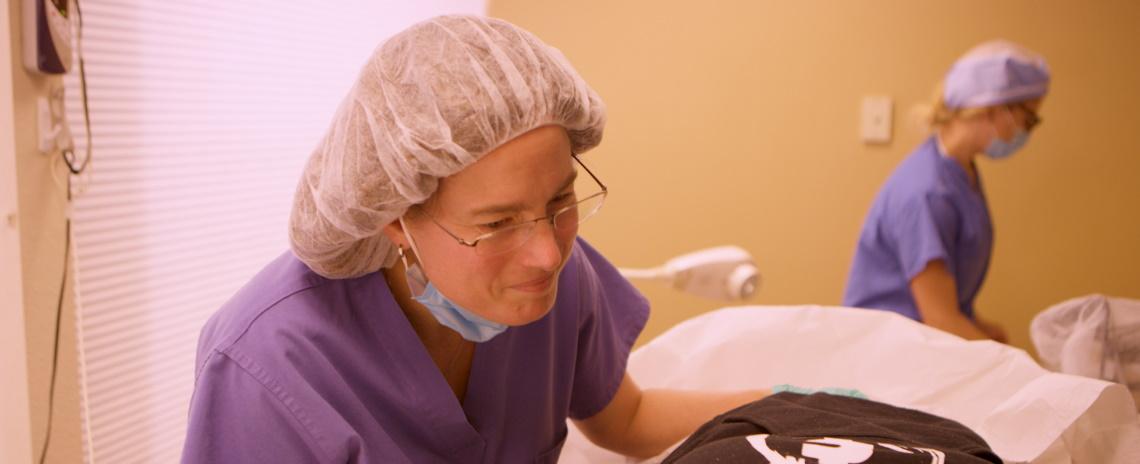Throughout the 28th Annual Whitaker St. Louis International Film Festival (SLIFF), the writers at the Lens will be spotlighting their favorite narrative and documentary films on this year's festival schedule. Our critics will discuss can't-miss festival highlights, foreign gems that have already made an international splash, and smaller cinematic treasures that might have overwise been overlooked – just in time for you to snap up tickets.
Ever since British director Tony Kaye’s staggering, still-underappreciated documentary Lake of Fire premiered at the Toronto International Film Festival in 2006, non-fiction features about abortion have struggled in the shadow of that monumental work, even as the landscape surrounding reproductive rights in the United States has shifted dramatically over the past 13 years. While a handful of forthrightly pro-choice documentaries have successfully conveyed the enhanced urgency of the issue in the 2010s – most notably Martha Shane and Lana Wilson’s After Tiller (2013) and Tracy Droz Tragos’ Abortion: Stories Women Tell (2016) – few films have managed to offer a truly novel perspective that goes beyond red-alert despair about the state of the world.
Jan Haaken’s new film Our Bodies Our Doctors achieves this uncommon feat partly by offering a direct riposte to the conspiratorial scaremongering of anti-choice activists, who insist that a vast, for-profit “abortion industrial complex” thrives behind the scenes. To wit: Haaken’s feature tethers its viewpoint to the medical professionals who work in this “industry” every day, revealing the common thread of clear-eyed moral resolve that truly motivates such people. In this way, Our Bodies Our Doctors manages to pull of an unlikely advocacy-doc hat trick: deflating a feverish anti-choice talking point; highlighting the everyday heroism of doctors, nurses, administrators, and other medical staff; and shining a light on the abortion issue from a vital yet neglected angle. To be sure, Haaken’s film feels quite cinematically conventional when compared to a more artistically inspired treatment of the topic like Lake of Fire. Our Bodies Our Doctors is much narrower in focus and more ferociously pro-choice in its biases, to be sure. However, it’s also dense with winning personalities and vital insights, such that its 78-minute running time flies by – even if the subject matter is often disillusioning.
The secret to the film’s success lies in the medical professionals it profiles – many but not all of them women. Haaken clearly made an effort to carefully select a roster of charismatic and passionate individuals who speak frankly about the importance of their work. The doctors featured in the film tend to skew younger and more diverse than the older, white male physicians that are often imagined as the primary abortion providers pre- and immediately post-Roe. This is, of course, by design, as one of the documentary’s aims is to illustrate how the face of abortion services has changed in recent years, and to more generally de-mystify what remains an oddly taboo topic, even among ostensibly pro-choice Americans. Haaken allows her subjects to expound on the reasons they do what they do, and to describe a typical day – such as at is – in an abortion clinic. To the latter end, Our Bodies Our Doctors also presents fly-on-the-wall footage of the daily operations at several such clinics, observing as patients are counseled about and (in some cases) undergo abortion. (Haaken respectfully allows these women to remain anonymous, and the gory medical details are kept discreetly out of sight – unlike Lake of Fire, there are no graphic depictions of abortion in the film.)
While Our Bodies Our Doctors is pitched towards the current topography of women’s reproductive health – an intense anxiety about the future understandably clouds the film’s otherwise tough-minded tone – Haaken does offer some fascinating historical context. The film touches base with figures from the pre-Roe Jane Collective, for example, who describe how the organization helped facilitate access to underground abortion providers in the 1960s and 70s. Elsewhere, the film’s physician interviewees provide a valuable explanatory framework for the current state of abortion as a medical procedure. Ever wondered why most abortions are performed in standalone clinics instead of hospitals? As the film’s doctors elucidate, a post-Roe increase in mergers between Catholic and secular hospitals unfolded primarily for financial reasons. However, it had unanticipated consequences for patients as anti-choice religious mandates started to squeeze out doctors who performed abortions.
Occasionally, Haaken’s feature overextends itself, as in a late-film swerve into intersectionality that awkwardly connects the film’s primary subject with the issue of LGBT medical rights. It’s a well-intentioned aside, but in execution it feels clunky and conspicuously tacked-on. Such missteps stand out, however, because Our Bodies Our Doctors is such a smart, affecting documentary overall, one that sharply conveys the unflagging importance of expansive reproductive rights and the unassuming bravery of its subjects.
Our Bodies Our Doctors screens Sunday, Nov. 10 at 3:30 p.m. at the Tivoli Theatre. The screening is ticketed but free to attend.


